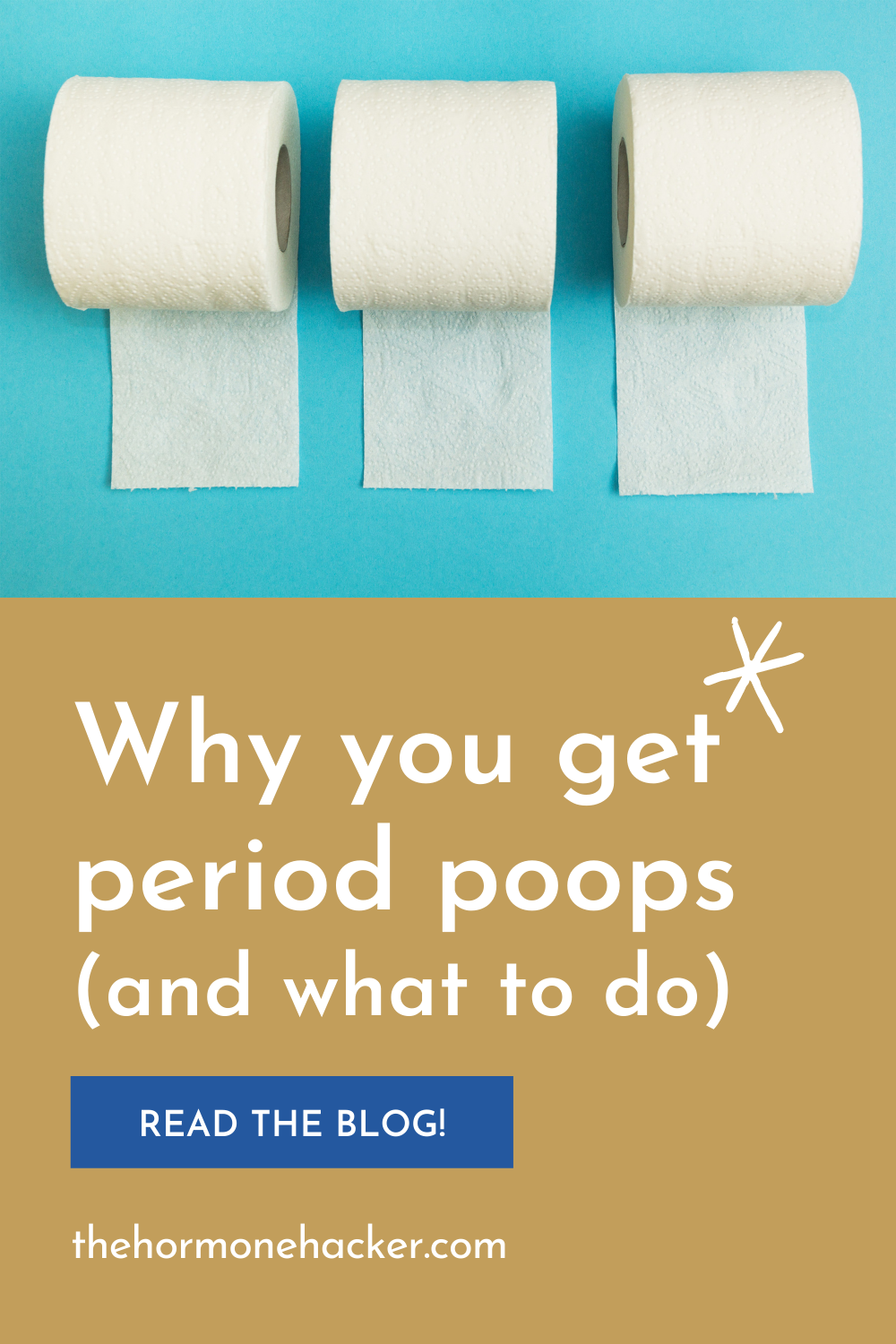We’ve all been there. You feel like you can’t “go” for days, but then your period arrives and it’s a totally different story.
There are two major factors that lead to “period poops:”
1. Dropping Progesterone
Quick Hormones 101 recap: The time between the start of a period and ovulation is called the “Follicular Phase.” The time between ovulation and the next period is the “Luteal Phase.”
Many menstruators find that during their follicular phase, they have regular, predictable poops. In these weeks, estrogen is the dominant player, encouraging smooth muscle contractions in your digestive tract to keep things movin’ smoothly.
But then, they find that in the luteal phase, they become constipated. Progesterone is produced after ovulation and is the dominant hormone of your luteal phase. It has muscle relaxant qualities, which makes it harder for your bowels to contract in the way that leads to bowel movement. Basically, digestion slows down in the luteal phase.
Progesterone levels plummet when your period begins. Suddenly, the constipating effect of progesterone disappears, and what’s left inside you might come out quickly and loosely.
2. Prostaglandins
Prostaglandins are hormone-like substances that respond to inflammation in the body. Right before your period starts, your endometrium (the lining of your uterus) releases prostaglandins. They help the smooth muscle of your uterus’ contract in order to shed the lining (which manifests as your period).
Here’s the thing-- prostaglandins exist all over your body and can enter the bloodstream to affect other organs. Your bowel is very close to your uterus, so when uterine contractions increase, your bowel contractions can increase, too, leading to more and/or more frequent poops for those first few days of your cycle.
Side note: Prostaglandins are also what lead to cramps. A lot of people who have painful periods also have rough period poops, since the root is the same.
Read this post to find out the cause of cramps and how to ease them!
Managing Period Poops
Sometimes, it can feel like a relief to, well, let everything out after being a bit constipated through your premenstrual phase. But of course, if your body releases too many prostaglandins, you can end up rushing to the toilet or hanging out near one throughout your period, which totally sucks.
Plus, when you make more prostaglandins than you need, symptoms can get real rough (think headaches, terrible cramps, nausea…).
So, what can you do? Lessen prostaglandin response by decreasing inflammation!
1. Manage Your Stress
When you’re overly stressed, your cortisol levels rise. High cortisol leads to more inflammation, and all the uncomfortable effects downstream.
Plus, your stressed state throws you into “fight or flight mode,” where your digestion slows down.
If you haven’t caught on, stress management is the #1 tool to use in all aspects of holistic health. Commit to it. :)
2. Enjoy Anti-Inflammatory Foods
Research shows that including Omega 3 fatty acids in your diet (and lessening your intake of Omega 6 fatty acids) can help manage inflammation and prostaglandin response.
It’s beneficial in all parts of your cycle to include fruits, veggies, nuts, seeds and whole grains. Learning to eat with your cycle keeps nutrition fun and ensures you get a huge variety of nutrients throughout the cycle. (Learn how to eat with your cycle here!)
3. Support Gut and Liver Health
You obviously want great digestion all cycle long, not just during your period. If you’re not pooping at least once a day, or you’re having regular diarrhea, you might want to dig into what’s going on in your gut.
Your liver is a crucial player in metabolizing estrogen, so if your liver isn’t functioning optimally, you could get some rough period side effects. Heavy periods + period poops = not a fun few days. Show your liver some love and the benefits will affect your whole body.
4. Chart Your Cycles
Your menstrual cycle is a vital sign and can often help you uncover deeper health issues (like in your gut, thyroid or adrenals). Just one more reason to love charting!
Charting apps (like my favorite, Read Your Body) often have customizable spots for you to record whatever data you want-- like your poops! Throw some observations about your digestion on your chart and you’ll likely pick up on patterns in just a few cycles. Then, you’ll be able to know what to expect and when in future cycles.
Want to improve your period poops?
Look at your health holistically, and you can find simple lifestyle tweaks and tools to get a better period and entire cycle!
Check out my self-paced course to make a positive difference in your health and life:
As always, nothing in this post should be taken as medical advice or diagnosis. Always consult your healthcare provider with your concerns before trying anything mentioned in this post or anywhere on this website.
Sources:
https://www.ncbi.nlm.nih.gov/books/NBK279054/
https://www.pcrm.org/good-nutrition/nutrition-information/using-foods-against-menstrual-pain#:~:text=Before%20a%20period%20begins%2C%20the,layer%20contract%2C%20causing%20painful%20cramps
What weird period symptoms do you get but not know why they happen?

